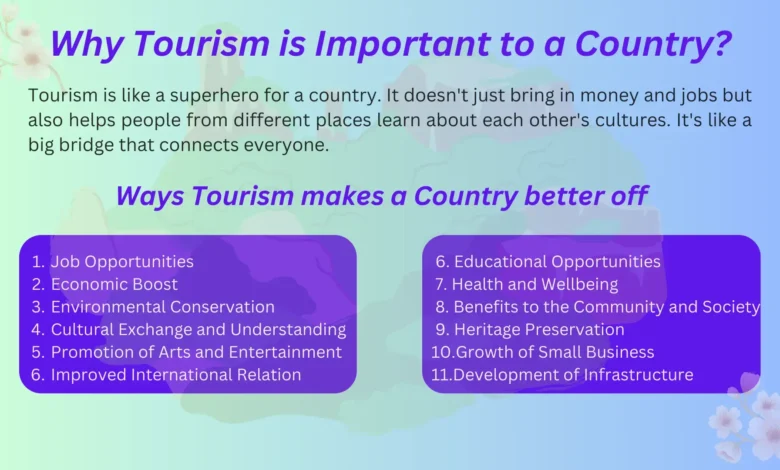
Why Tourism is Important to a Country?
Tourism is important to a country? Tourism isn’t just about vacations, it’s a lively and varied industry that strongly influences how a country grows economically, socially, and culturally. It’s more than just pretty pictures and beautiful places; it helps create jobs, boosts the economy, improves infrastructure, fosters cultural sharing, and keeps our heritage alive. In this article, we’ll explore the many ways tourism makes a country better off, showing how it has a big impact.
Tourism is Important to a Country
Following are the key facts that tourism makes a country better off:
Job Opportunities
Witness the pivotal role tourism plays in job creation across various sectors. From tour guides and hotel staff to craftspeople and transportation specialists, a surge in demand catalyzed by the expanding tourism industry mitigates unemployment and provides diverse learning experiences. The flexibility of tourism also stabilizes local economies, offering employment opportunities during specific seasons.
Economic Boost
Explore the direct impact of tourism on a country’s economic expansion. The spending by tourists not only directly stimulates the local economy but also ripples through other industries. The increased demand for lodging, food services, transportation, and entertainment sustains existing businesses and generates new job prospects. Lesser-known areas also benefit from tourism, drawing investments and fostering economic development.
Environmental Conservation
While acknowledging the potential negative impact on the environment, the article emphasizes the growing recognition of the need for sustainable tourism practices. Communities are increasingly adopting eco-friendly tourist programs to ensure the long-term preservation of a country’s natural beauty and distinctiveness.
Cultural Exchange and Understanding
Uncover the role of tourism as a bridge between cultures, offering an opportunity for mutual learning. It goes beyond being a mere vacation, facilitating the exchange of ideas and fostering global connectivity and understanding. The article highlights the bidirectional nature of this cultural exchange, enriching both visitors and locals.
Promotion of Arts and Entertainment
Delve into how tourism drives the demand for entertainment, festivals, and cultural events, thereby enlivening a country’s cultural landscape. Genuine experiences sought by travelers support regional performers and artists, nurturing an appreciation for local customs and arts.
Improved International Relation
Examine how a country’s welcoming attitude towards tourists fosters positive international relations. Positive visitor experiences contribute to enhanced goodwill, shaping favorable opinions about the nation and community. The resultant improved international reputation attracts foreign partnerships, investments, and diplomatic contacts.
Educational Opportunities
Highlight the educational benefits of tourism for both residents and visitors. Residents engage in language study and cultural interactions, while visitors learn about the country’s history, customs, and culture, fostering global awareness and understanding.
Health and Wellbeing
Explore how the tourism sector enhances the health and happiness of a country’s citizens. Parks, recreation centers, and wellness programs designed with tourists in mind provide areas for leisure, exercise, and relaxation, benefiting both locals and visitors.
Benefits to the Community and Society
Engagement and pride in the community are fostered by tourism. Residents feel a sense of pride and belonging when they witness visitors appreciating their country. Furthermore, tourism frequently sparks neighborhood gatherings, festivals, and other events that strengthen social cohesion.
Heritage Preservation
Emphasize the important role tourism plays in preserving a country’s cultural legacy. Tourists keen on learning about history and customs contribute to the preservation of historical sites and customs, ensuring their legacy for future generations.
Growth of Small Business
With more tourists visiting the area, local businesses especially small ones do well. Travel offers a clientele that supports the expansion of small enterprises, such as family-owned eateries and charming gift shops. Thus, a country’s offerings gain character, and entrepreneurship is encouraged.
Development of Infrastructure
The infrastructure of a country is frequently improved by tourism. Better roads, public areas, and transit infrastructure are invested in to accommodate and please tourists. Through the creation of a more functional and appealing national environment, these advancements help locals as well as tourists.
Conclusion
Tourism acts as a superhero for a country, bringing more than just money and jobs. It serves as a bridge, connecting people from different places and fostering cultural understanding. This industry not only contributes to economic growth but also promotes environmental care and international friendships. It goes beyond pretty pictures, supporting small businesses, preserving traditions, and enhancing the overall quality of life in countries. When done thoughtfully, tourism works like magic, making countries lively, friendly, and filled with fascinating stories for everyone.




